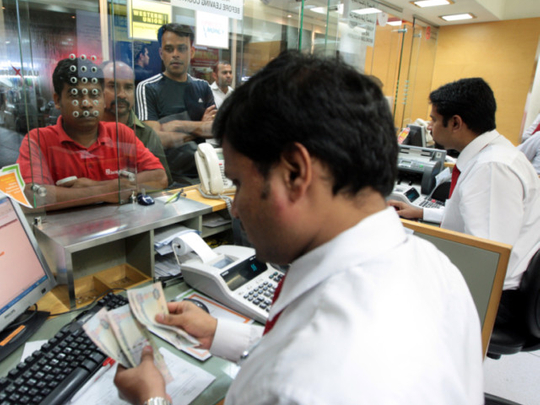
Dubai: Indian expats who take loans at high interest rates to remit money back home could land in a vicious debt trap, finance experts have cautioned.
Weighed down by the US dollar’s gain against other currencies, the Indian rupee has slumped to record lows. The massive drop has seen an unprecedented surge in remittances from the UAE, home to over two million Indians.
In order to make the most of this opportunity, many have resorted to taking loans from banks and money lenders. Financial experts said this is a dangerous trend.
“Those unable to get personal loans go for private money lenders and end up paying anywhere between 100 per cent and 120 per cent on annual interest alone. We had a similar situation many years back. People took loans on high interest rates. Unable to get out of the debt trap, some committed suicide,” said K.V. Shamsudheen, Director, Barjeel Geojit Securities.
“People assume there is no harm in taking a loan and sending the money back home. But one must never forget that a loan, for whatever purpose, is a debt that needs to be repaid. People must not borrow from money lenders or use credit cards thinking they would be able to get exchange rate benefits,” said Shamsudheen, who is also the founder of a welfare organisation called Pravasi Bandhu Welfare Trust.
According to financial advisers, opting for a loan would make sense only if one has the repaying capacity and is able to get a return that is higher than the interest paid on the loan.
“We have clients who have taken loans to invest in property and instruments that fetch decent returns. However, I would never recommend that you borrow from your credit card and pay 30 to 36 per cent interest. That makes no financial sense at all. You need to look at your own credit worthiness as well as the net benefit you can get if you take a loan,” said Nitin Sood, a Dubai-based financial consultant.
“Some invest in fixed deposits which fetch about 9 per cent annually. It’s good provided the interest on your loan works to about 6 to 7 per cent. Investing in property is also a good option. Some mutual funds also give attractive returns,” said Sood.
Remittances have grown 10-12 per cent in the last six months.
The Indian rupee hit a record low of 61.80 to the dollar last week. On August 14, one dirham fetched 16.75 Indian rupees.
A recent poll of 17 analysts showed the situation might remain unchanged in the months to come. Experts reckon the rupee would trade around 61 by the end of August, 59.75 in six months and 60.50 by July next year.
Krishnan Ramachandran, CEO, Barjeel Geojit Securities, said the falling rates have prompted many expats to invest in fixed deposit schemes.
“There is huge interest because fixed deposit schemes are fully repatriable and the interest earned is not taxable,” he said.
Currently, the Lakshmi Villas Bank offers 9-9.25 per cent returns on fixed deposits, The ICICI bank gives 7.5-9 per cent, Bank of Baroda 8-8.9 per cent and SBI and HDFC 8-8.75 per cent.
Mutual funds offering some of the highest returns include Franklin India Blue Chip Funds (12.14 per cent returns), Reliance NRI Equity Fund (14.47 per cent), UTI Opportunities Fund (15.94 per cent), ICICI Pru Banking & Financial Services Fund (15.69 per cent) and HDFC Balanced Fund (14.11 per cent)
Ramachandran said expats should go for a Systematic Investment Plan (SIP) to make the most of their money.
“Ideally, one should invest a fixed amount into a schemes for a specific period of time. This will balance out market vagaries and volatility and will give good returns over a period of time. They can also look into insurance schemes, though they don’t yield as much returns.”


